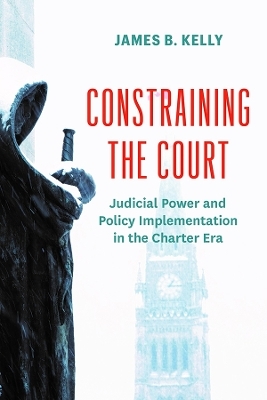
Constraining the Court
University of British Columbia Press (Verlag)
978-0-7748-7048-1 (ISBN)
- Noch nicht erschienen (ca. Dezember 2024)
- Versandkostenfrei innerhalb Deutschlands
- Auch auf Rechnung
- Verfügbarkeit in der Filiale vor Ort prüfen
- Artikel merken
When the Supreme Court of Canada makes a decision that invalidates a statute, it creates a constitutional moment. But does that have a direct and observable impact on public policy? Constraining the Court explores what happens when a statute involving a significant public policy issue – French language rights in Quebec, supervised consumption sites, abortion, or medical assistance in dying – is declared unconstitutional. James B. Kelly examines the conditions under which Parliament or provincial/territorial legislatures attempt to contain the policy impact of judicial invalidation and engage in non-compliance without invoking the notwithstanding clause. He considers the importance of the issue, the unpopularity of a judicial decision, the limited reach of a negative rights instrument such as the Charter, the context of federalism, and the mixture of public and private action behind any legislative response. While the Supreme Court’s importance cannot be denied, this rigorous analysis convincingly concludes that a judicial decision does not necessarily determine a policy outcome.
James B. Kelly is a professor in the Department of Political Science at Concordia University. He is the author of Governing with the Charter: Legislative and Judicial Activism and Framers’ Intent, which was shortlisted for the 2005 Donner Prize. He served as the 2006–07 Seagram Chair in Canadian Studies at the McGill Institute for the Study of Canada, where he coedited Contested Constitutionalism: Reflections on the Canadian Charter of Rights and Freedoms with Christopher P. Manfredi. With Janet L. Hiebert, he is also a coauthor of Parliamentary Bills of Rights: The Experiences of New Zealand and the United Kingdom. He has been a visiting fellow at the Centre for Comparative Constitutional Studies at Melbourne Law School; a visiting professor at the Faculty of Law of Bar-IIan University, Israel; and an editor of the Canadian Journal of Political Science.
Introduction: Constraining the Court
1 Judicial Power and Policy Implementation in the Charter Era
2 Quebec and the Canadian Charter of Rights and Freedoms: Une province pas comme les autres
3 Minority Language Education Rights and the Charter of French Language: Plus ça change, plus c’est la même chose
4 Bridging Schools and the "Major Part Requirement": Designing and Implementing the 2010 Charter of the French Language
5 Quebec’s "Sign Law" and Freedom of Expression: Ford, Devine, and the Bourassa Government’s Response
6 Supervised Consumption Sites and the Respect for Communities Act: How the Harper Government Outflanked the McLachlin Court
7 The Opioid Crisis and Canadian Federalism: From Supervised Consumption to Overdose Prevention Sites
8 Physician-assisted Suicide to Medical Assistance in Dying: When Carter Met Federalism
Conclusion: Legislative Disagreements and Policy Implementation in the Charter Era
Appendix: Remedial Activism, 1982–2022 (Statutes, Ministerial Discretion, and Administrative Decisions)
Notes; Bibliography; Index
| Erscheint lt. Verlag | 15.12.2024 |
|---|---|
| Reihe/Serie | Law and Society |
| Zusatzinfo | 16 tables, 12 graphs |
| Verlagsort | Vancouver |
| Sprache | englisch |
| Maße | 152 x 229 mm |
| Gewicht | 640 g |
| Themenwelt | Recht / Steuern ► Allgemeines / Lexika |
| Recht / Steuern ► EU / Internationales Recht | |
| Recht / Steuern ► Öffentliches Recht ► Verfassungsrecht | |
| Sozialwissenschaften ► Politik / Verwaltung ► Staat / Verwaltung | |
| ISBN-10 | 0-7748-7048-6 / 0774870486 |
| ISBN-13 | 978-0-7748-7048-1 / 9780774870481 |
| Zustand | Neuware |
| Informationen gemäß Produktsicherheitsverordnung (GPSR) | |
| Haben Sie eine Frage zum Produkt? |
aus dem Bereich


